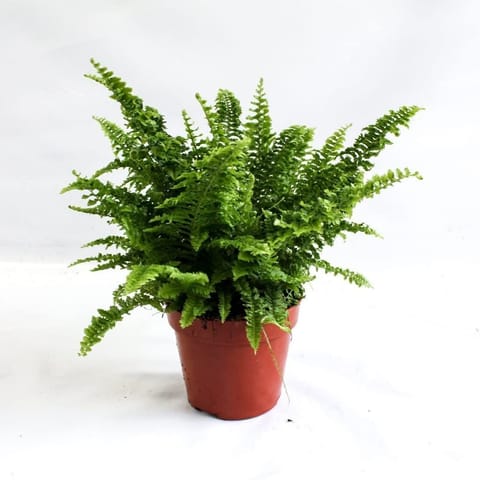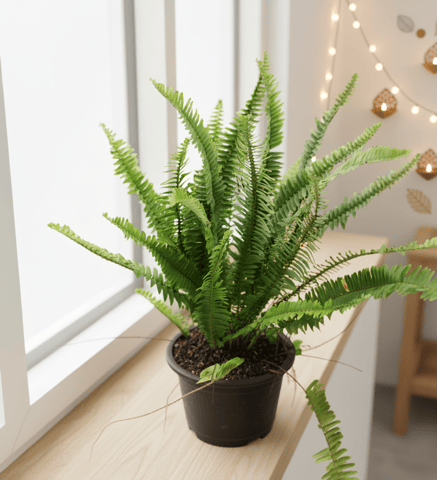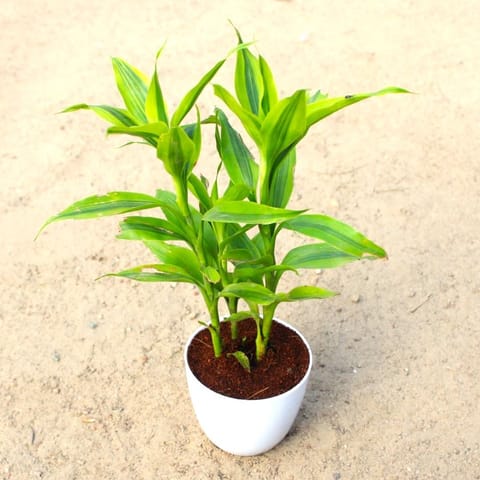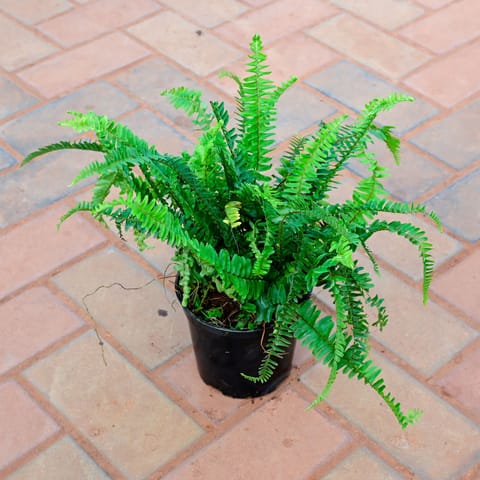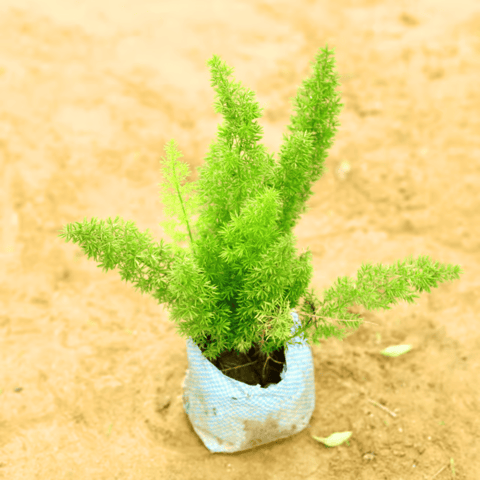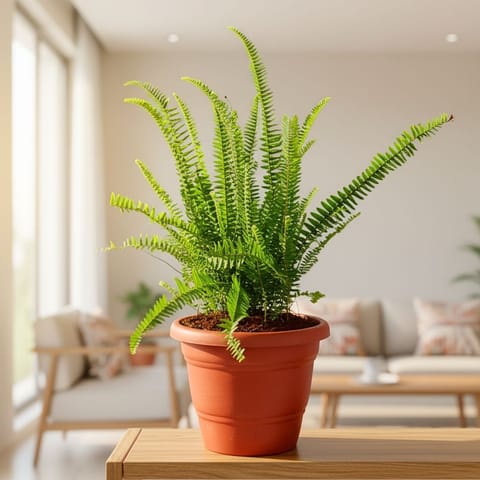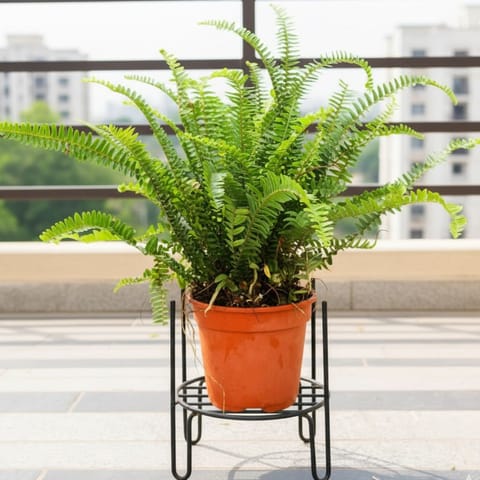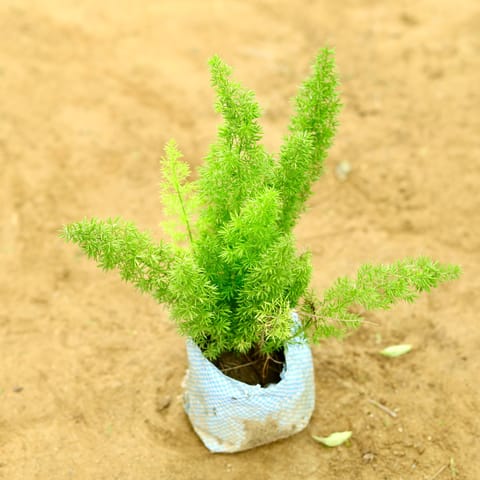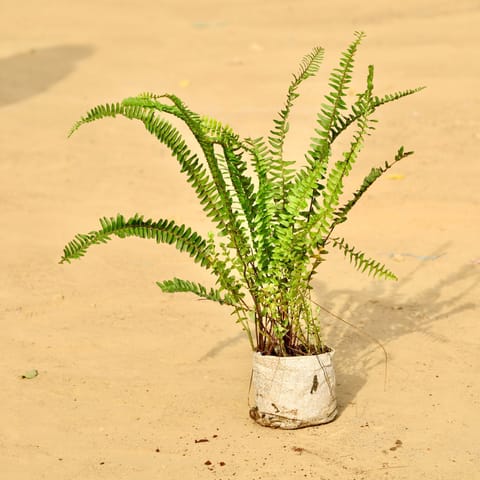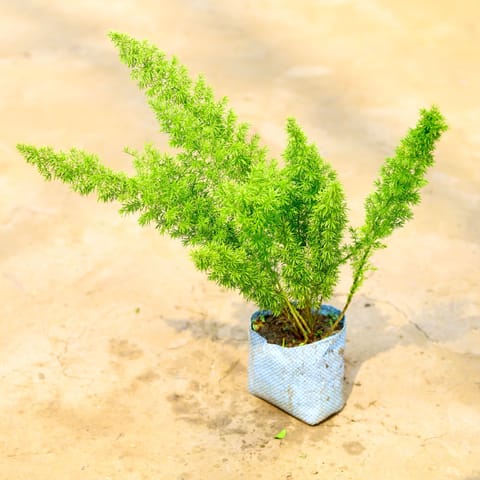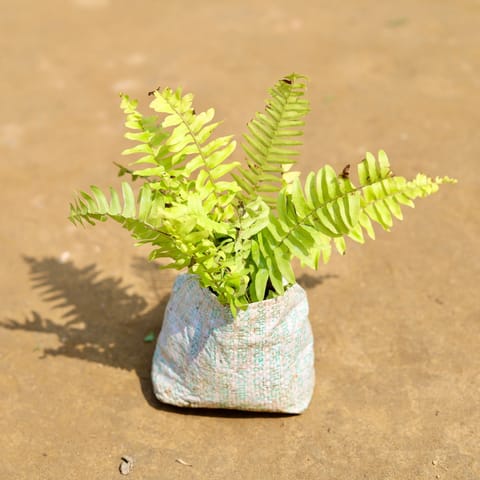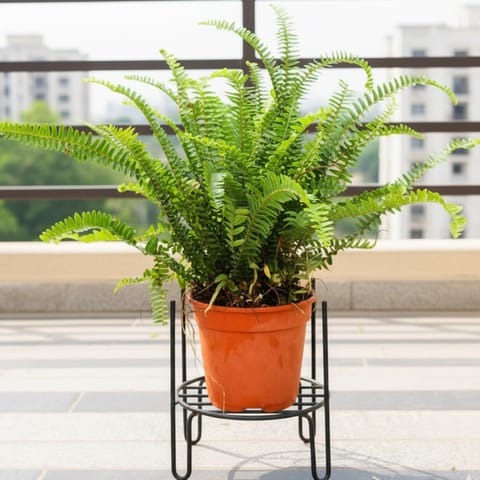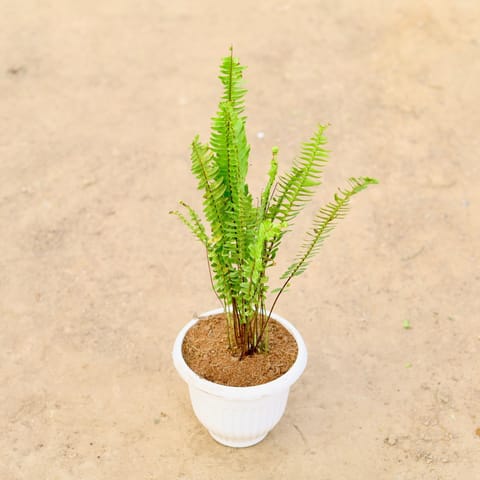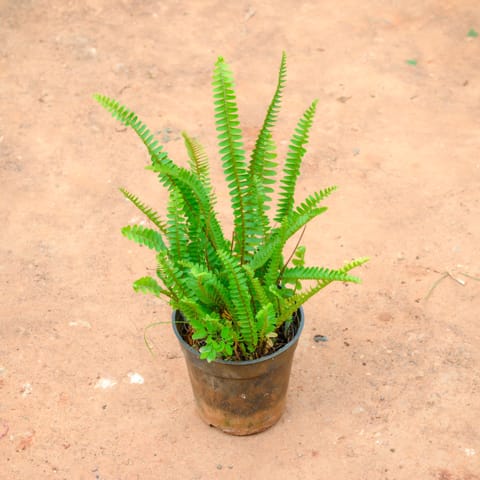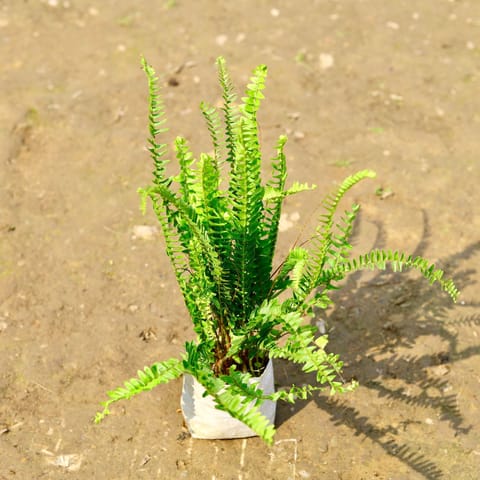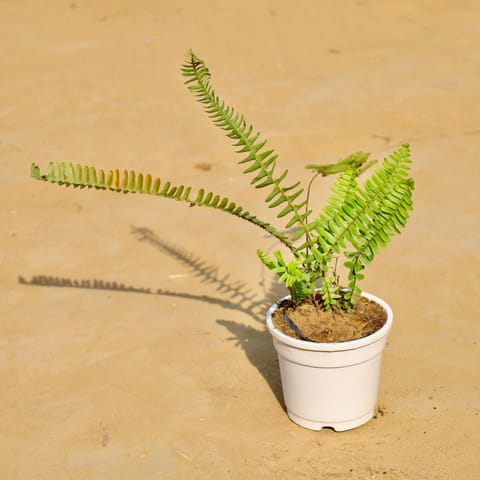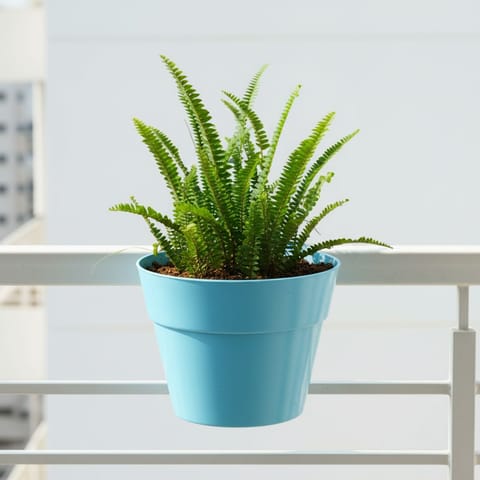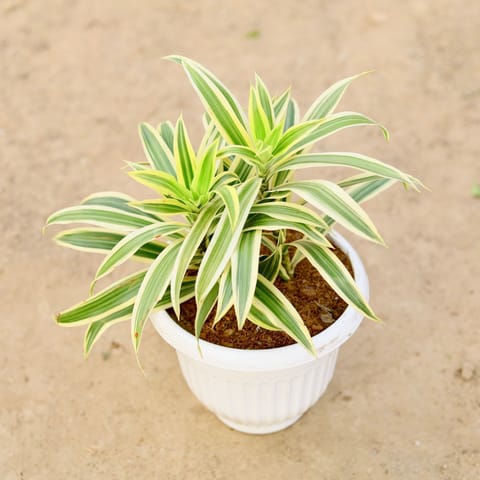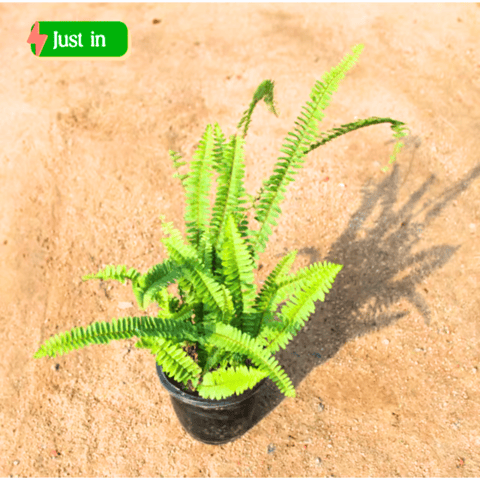Shop

Downalod our app
Search our catalog

Please provide your delivery pincode to see products available in your area
Are you sure you want to logout?
You will be logged out of your account
Your current session will end and you'll need to sign in again to access your account.
Ferns Collection
The Fern plant, with its exquisite fronds unfurling like delicate works of ...
The Fern plant, with its exquisite fronds unfurling like delicate works of art, embodies a mesmerizing beauty that captivates the observer.
Its lush green foliage, intricately patterned and gracefully arching, creates a serene and enchanting atmosphere. The feathery leaves remind one of nature's intricate grace and breathe life into any space they inhabit. Whether nestled in a shaded garden or gracing a living room corner, the Fern's timeless elegance transcends environments. If you wish to buy fern plants for sale, head over to Urvann to find the best collection of plants at budget-friendly prices.
Benefits and Uses of Ferns
As the fern gracefully sprawls, it imparts a sense of ancient wisdom. Here are a few benefits of the plant.
Ornamental ValueFerns are commonly used for decorative purposes in gardens, landscapes, and indoor spaces. Their unique and intricate fronds add a touch of elegance and lush greenery to any setting.
Low-MaintenanceThe Ferns plants are easy to care for and require minimal attention. These flowering plants are suitable for both novice and busy gardeners.
Erosion ControlThe Ferns plant's root system helps prevent soil erosion, particularly in areas prone to erosion, providing additional stability to the landscape.
Air-PurificationFerns are known for their ability to improve indoor air quality by filtering out pollutants and toxins. They can absorb and break down pollutants such as formaldehyde and benzene, contributing to a healthier indoor environment.
Maintenance and Caring Tips for Ferns
The fern plant is a symbol of the artistry of Mother Nature. Here is how you can care for this beautiful plant.
WateringThe Fern plant must be watered periodically. As soon as the top one inch of the soil gets dry, you must water it.
LightThe Fern is a plant that does extremely well in temperatures between 15 - 30 degrees Celsius. Keep it in full sunlight during this time.
PlacementThe Fern is an outdoor plant and loves the sunlight and humid conditions.
FertilisationThe Fern is not a very demanding plant. You can use vermicompost or cow dung compost every 15 days to maintain its nutrition balance.
Ideal Soil MixThe Fern plant requires porous, well-draining soil.
Pest ControlThe Ferns plant is susceptible to scale insects. Control the pests by using neem oil spray every week on the leaves.
Why Buy Fernss from Urvann?
Urvann has the best and most budget-friendly collection of sapling or potted Ferns for sale online. The website also offers many discounts at its online nursery with schemes such as Plants Under 199 running. Urvann guarantees free next-day delivery of plants right to your doorstep. The browsing experience is smooth and navigation is seamless. To buy Fernss online, visit Urvann today!
FAQ About Ferns
1. Is fern a nice plant to have at home?
Yes, ferns are a lovely addition to any garden and are incredibly simple to grow.
2. What are the benefits of fern plants?
Ferns greatly contribute to ecosystems by providing shelter, shade, and erosion control that serve other species.
3. Do ferns require bright sunshine?
Ferns require bright, direct sunshine to thrive.
4. Does the ecosystem benefit from ferns?
Yes, because of its extensive root system, the fern plant keeps the soil from eroding and becoming desertified.
5. What makes ferns happy?
Most ferns like evenly moist soil with regular watering.
The Fern plant, with its exquisite fronds unfurling like delicate works of art, embodies a mesmerizing beauty that captivates the observer.
Its lush green foliage, intricately patterned and gracefully arching, creates a serene and enchanting atmosphere. The feathery leaves remind one of nature's intricate grace and breathe life into any space they inhabit. Whether nestled in a shaded garden or gracing a living room corner, the Fern's timeless elegance transcends environments. If you wish to buy fern plants for sale, head over to Urvann to find the best collection of plants at budget-friendly prices.
Benefits and Uses of Ferns
As the fern gracefully sprawls, it imparts a sense of ancient wisdom. Here are a few benefits of the plant.
Ornamental ValueFerns are commonly used for decorative purposes in gardens, landscapes, and indoor spaces. Their unique and intricate fronds add a touch of elegance and lush greenery to any setting.
Low-MaintenanceThe Ferns plants are easy to care for and require minimal attention. These flowering plants are suitable for both novice and busy gardeners.
Erosion ControlThe Ferns plant's root system helps prevent soil erosion, particularly in areas prone to erosion, providing additional stability to the landscape.
Air-PurificationFerns are known for their ability to improve indoor air quality by filtering out pollutants and toxins. They can absorb and break down pollutants such as formaldehyde and benzene, contributing to a healthier indoor environment.
Maintenance and Caring Tips for Ferns
The fern plant is a symbol of the artistry of Mother Nature. Here is how you can care for this beautiful plant.
WateringThe Fern plant must be watered periodically. As soon as the top one inch of the soil gets dry, you must water it.
LightThe Fern is a plant that does extremely well in temperatures between 15 - 30 degrees Celsius. Keep it in full sunlight during this time.
PlacementThe Fern is an outdoor plant and loves the sunlight and humid conditions.
FertilisationThe Fern is not a very demanding plant. You can use vermicompost or cow dung compost every 15 days to maintain its nutrition balance.
Ideal Soil MixThe Fern plant requires porous, well-draining soil.
Pest ControlThe Ferns plant is susceptible to scale insects. Control the pests by using neem oil spray every week on the leaves.
Why Buy Fernss from Urvann?
Urvann has the best and most budget-friendly collection of sapling or potted Ferns for sale online. The website also offers many discounts at its online nursery with schemes such as Plants Under 199 running. Urvann guarantees free next-day delivery of plants right to your doorstep. The browsing experience is smooth and navigation is seamless. To buy Fernss online, visit Urvann today!
FAQ About Ferns
1. Is fern a nice plant to have at home?
Yes, ferns are a lovely addition to any garden and are incredibly simple to grow.
2. What are the benefits of fern plants?
Ferns greatly contribute to ecosystems by providing shelter, shade, and erosion control that serve other species.
3. Do ferns require bright sunshine?
Ferns require bright, direct sunshine to thrive.
4. Does the ecosystem benefit from ferns?
Yes, because of its extensive root system, the fern plant keeps the soil from eroding and becoming desertified.
5. What makes ferns happy?
Most ferns like evenly moist soil with regular watering.
